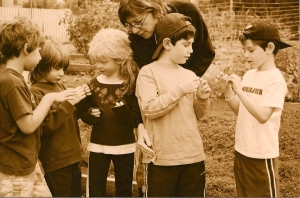
A woman I know was driving to work one morning when she pulled along side a taxi where she saw a small child, very cute, riding alone in the back seat looking out the window at her. At first she was puzzled about who would let their three or four-year-old ride alone in a taxi, when she realized that the driver must be the child’s father. At the next light she rolled down her window and got the driver’s attention. “Is that your child?” she asked. The driver proudly said that he was, and then the woman suggested that the child should be wearing a seatbelt. The driver was swept by fatherly concern and reached back and got his kid buckled in safely. And then he buckled his own seat belt.
In a non-threatening and non-shaming manner, this woman showed care for someone else’s child. This is the privilege of parenting the world.
A man I know teaches school and it’s his first year in the unforgiving trenches of public education. Being green, they have given him the hardest kids, those with learning difficulties and emotional problems—the ones the seasoned teachers don’t want to (or no longer have to) deal with. One boy in his class could not read, but was already in high school. His native language was Spanish and at the first conference of the year, the boy’s father, whose English was also quite limited and who had less education than his son, asked what he could do to help. The teacher told him to subscribe to the LA Times and read it every day with his kid.
The father went home, subscribed to the LA Times and read it every day with his son. And now, as we near the end of the school year, that child is reading quite well. It struck me that the teacher was not particularly proud of himself, he didn’t fully realize how much he had helped—in fact he was more impressed with the level of love and commitment that this father was willing to give to his son. It filled him with respect and admiration for that father, but also with sadness that he didn’t get that sort of involvement and love from his own father, a man with a lot of education but no time for his son.
Our world abounds with “parents” who may or may not have children of their own, but who love the world and take compassionate care of it. In fact, sometimes we are freer to be at our best when dealing with those who are not members of our immediate families; and maybe these optimal parenting moments can be lessons we bring back to our children, our partners and ourselves.
Perhaps we might dedicate today to loving the world and our own children in the service of one specific child who is not our child. Maybe this is a little girl we see walk by our window every day, or a boy we watch get into the cab that takes him to his special needs school. Every town is our town, and every child is our child. And everyone who cares, and who does not yet care, are our fellow parents.
Namaste, Bruce


